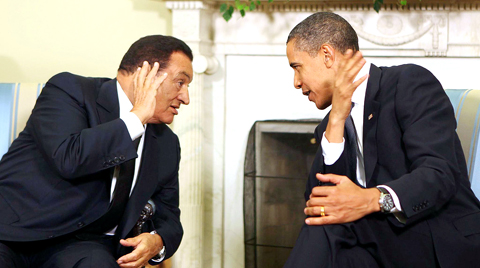US President Barack Obama won lavish praise on Tuesday from his guest, Egyptian President Hosni Mubarak, and spoke of an “extraordinary opportunity” for making peace in the Middle East.
Obama said he was encouraged by US efforts to restart talks between Israel and the Palestinians.
Seated next to Mubarak, who was making his first visit to the US capital in five years, Obama thanked the Egyptian for joining him in trying to construct a deal that has eluded world leaders for more than six decades.

PHOTO: EPA
Returning the compliment, Mubarak asserted that Obama’s speech to the world’s Muslims, delivered in Cairo in June, had convinced Arabs that the US truly was an honest broker.
The 81-year-old Egyptian leader, who was estranged from the former Bush administration, said Obama had “removed all doubts about the United States and the Muslim world.”
“The Islamic world had thought that the US was against Islam, but his [Obama’s] great, fantastic address there has removed all those doubts,” Mubarak said.
Obama’s positive assessment of the peace effort was issued in response to a question about reports that Israel had stopped granting permission for new settlements in the West Bank, even though building in progress was continuing.
Obama has made resuming peace talks between Israel and the Palestinians a major foreign policy goal, hoping a breakthrough there would lead to wider agreements among the Jewish state and its Arab neighbors.
To that end, Obama has demanded that the government of Israeli Prime Minister Benjamin Netanyahu freeze construction of Jewish settlements in East Jerusalem and the West Bank, land that the Palestinians want for a state. Netanyahu’s public refusal has opened a rare rift between the traditionally close allies.
Nevertheless, Obama said: “The Israeli government has taken discussions with us very seriously.”
He said he was “encouraged by some of the things I am seeing on the ground.”
“All parties have to take steps to restart serious negotiations,” including Palestinian efforts to end the incitement of violence against Israel, he said.
“If all sides are willing to move off of the rut that we’re in currently, then I think there is an extraordinary opportunity to make real progress, but we’re not there yet,” Obama said.
Mubarak said an end to Jewish settlement activity was central to a resumption of Israeli-Palestinian talks and a wider improvement of ties among the Israelis and all of their Arab neighbors.
To that end, Obama has demanded that the government of Israeli Prime Minister Benjamin Netanyahu freeze construction of Jewish settlements in East Jerusalem and the West Bank. Netanyahu’s public refusal has opened a rare rift between the close allies.
Nevertheless, Obama said: “The Israeli government has taken discussions with us very seriously.”
He said he was “encouraged by some of the things I am seeing on the ground.”
“All parties have to take steps to restart serious negotiations,” including Palestinian efforts to end the incitement of violence against Israel, he said.

Kehinde Sanni spends his days smoothing out dents and repainting scratched bumpers in a modest autobody shop in Lagos. He has never left Nigeria, yet he speaks glowingly of Burkina Faso military leader Ibrahim Traore. “Nigeria needs someone like Ibrahim Traore of Burkina Faso. He is doing well for his country,” Sanni said. His admiration is shaped by a steady stream of viral videos, memes and social media posts — many misleading or outright false — portraying Traore as a fearless reformer who defied Western powers and reclaimed his country’s dignity. The Burkinabe strongman swept into power following a coup in September 2022

‘FRAGMENTING’: British politics have for a long time been dominated by the Labor Party and the Tories, but polls suggest that Reform now poses a significant challenge Hard-right upstarts Reform UK snatched a parliamentary seat from British Prime Minister Keir Starmer’s Labor Party yesterday in local elections that dealt a blow to the UK’s two establishment parties. Reform, led by anti-immigrant firebrand Nigel Farage, won the by-election in Runcorn and Helsby in northwest England by just six votes, as it picked up gains in other localities, including one mayoralty. The group’s strong showing continues momentum it built up at last year’s general election and appears to confirm a trend that the UK is entering an era of multi-party politics. “For the movement, for the party it’s a very, very big

ENTERTAINMENT: Rio officials have a history of organizing massive concerts on Copacabana Beach, with Madonna’s show drawing about 1.6 million fans last year Lady Gaga on Saturday night gave a free concert in front of 2 million fans who poured onto Copacabana Beach in Rio de Janeiro for the biggest show of her career. “Tonight, we’re making history... Thank you for making history with me,” Lady Gaga told a screaming crowd. The Mother Monster, as she is known, started the show at about 10:10pm local time with her 2011 song Bloody Mary. Cries of joy rose from the tightly packed fans who sang and danced shoulder-to-shoulder on the vast stretch of sand. Concert organizers said 2.1 million people attended the show. Lady Gaga

SUPPORT: The Australian prime minister promised to back Kyiv against Russia’s invasion, saying: ‘That’s my government’s position. It was yesterday. It still is’ Left-leaning Australian Prime Minister Anthony Albanese yesterday basked in his landslide election win, promising a “disciplined, orderly” government to confront cost-of-living pain and tariff turmoil. People clapped as the 62-year-old and his fiancee, Jodie Haydon, who visited his old inner Sydney haunt, Cafe Italia, surrounded by a crowd of jostling photographers and journalists. Albanese’s Labor Party is on course to win at least 83 seats in the 150-member parliament, partial results showed. Opposition leader Peter Dutton’s conservative Liberal-National coalition had just 38 seats, and other parties 12. Another 17 seats were still in doubt. “We will be a disciplined, orderly